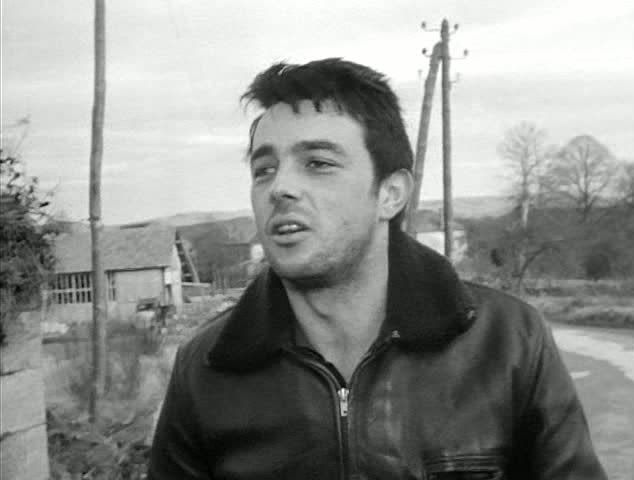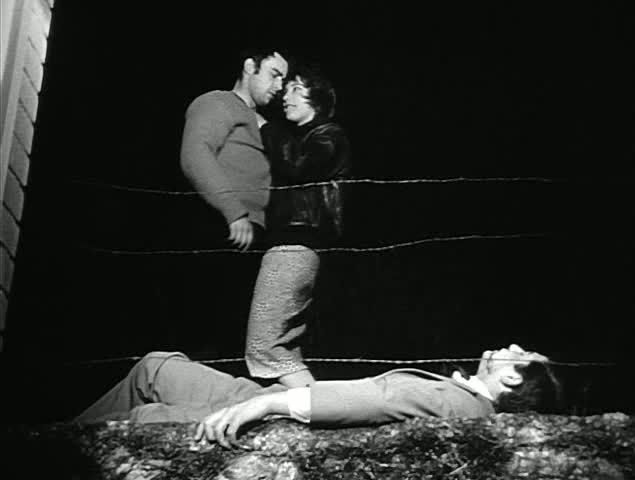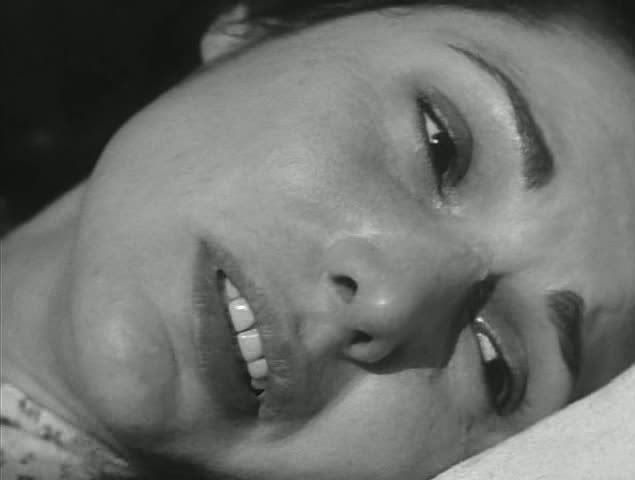
Claude Chabrol's first feature, Le beau Serge, was also in many ways the first feature of the French New Wave, or at least the first feature to be made by the small group of critics from Cahiers du cinema who eventually became the seminal filmmakers of the New Wave in the 60s. Chabrol's debut isn't as formally audacious or startling as the films to follow, from him and his peers, but it is a rough, raw, amateur film, ragged at the edges and seething with bleak intensity. It's the story of François (Jean-Claude Brialy), who returns from college to his small home town to recover from a debilitating illness, and who finds that much has changed in his absence. The people he once knew seem to have settled into depressing and unsatisfying lives, particularly his former best friend Serge (Gérard Blain), who has become an alcoholic good-for-nothing, stumbling drunkenly through town with his equally pathetic father-in-law, Glomaud (Edmond Beauchamp).
But Serge and Glomaud are only the worst cases of a general misery that afflicts the whole town: everyone seems beaten down, hopeless, from the lousy town doctor, who basically just watches over deaths and failed treatments, to the priest who's long ago given up on even trying to help anyone. François, who left the town for college, for better things, and returned only to rest and recover after his sickness, finds that those who didn't leave the town have been weighted down by the lack of options here, by the emptiness and the desolation of this town with nothing to do.
Though this is François' story, and it's told from his perspective as an outsider returning, Serge, as the title character, is the true center of the story, the magnetic core that everyone else is subtly and disastrously attracted towards. Blain plays Serge like a Gallic James Dean, in his leather jacket, his unshaven face, his cocky bad boy attitude and self-conscious cinematic poses. Later New Wave films would turn again and again to the American cinema for these kinds of recycled bad boys, these posing toughs copping their attitudes from Hollywood films, but Serge is a more authentic incarnation of the form than most. Jean-Paul Belmondo, in Godard's Breathless, seems like a wannabe Bogie, too small and insecure for the role he's trying to inhabit — which is, indeed, part of the point. Serge is different, in part because he's got not only Dean's cockiness and his sneer but also his vulnerability, the sense of a scared little kid hiding behind the leather and the tough expression. One thinks, almost inevitably, of Rebel Without a Cause, of the urgent and desperate desire for family and security that runs through that film. As with Dean's Jim Stark, Serge doesn't want to act like this, he doesn't want to be this pathetic drunk trying to act cool and tough, he's simply erecting defenses against the pain of his loneliness, of his unexpressed longing for a family, for love, for something, anything, more.

As François learns upon his return, Serge married Yvonne (Michèle Méritz), Glomaud's daughter, after getting her pregnant, but the baby was born with something wrong with it and quickly died. Now Yvonne is pregnant again, but Serge knows that things won't be any better this time, that it's too much to hope for a healthy child, for some normality and happiness. Instead, he accepts as "normal" the dissolute life he's been leading, and the miserable circumstances of this town where nobody really strives for anything better. François, for his part, thinks he can help, but really he just looks down on Serge, and on this whole milieu, with condescension and pity, as though from above the fray — while at the same time getting tangled up with Yvonne's younger sister Marie (Bernadette Lafont), well-known as a local tramp who switches boyfriends every day. François obviously likes to see himself as better than his former friends and peers, as well-situated to drag them out of their ruts, but his condescension only drives them away even as he gets pulled into a tawdry story of his own.
Chabrol tells this story, which is often melodramatic and despairingly bleak, in a direct, raw way, shooting mostly in the streets of the town and the surrounding countryside, seemingly in natural light. When he shoots interiors, they seem cramped and claustrophobic, and especially when more than two characters appear in a shot, the compositions are often full to bursting, as when François visits Serge's home for the first time and Marie and Yvonne gather around the two men as they catch up. The film is loose and ragged, a film made on the fly, with the feel of real places, real squalor and real desperation. It's obviously indebted to the Italian neorealist movement so admired by the Cahiers critics when they were just starting to make their own first films, and it looks forward to the looseness and amateur aesthetics of the other early New Wave features. The only unfortunate throwback to traditional aesthetics and traditional movies is the score, a jarringly inappropriate old-school movie score with cues intended to arouse bathos or suspense or cheeriness depending on the scene. Such emotional hand-holding seems like an artifact here, in a film that is otherwise quite bracing and unsentimental, a film that makes a mockery of its protagonist's moral certitude and fumbling attempts to make things right.

If the score is the most traditional aspect of Le beau Serge, the one element that captures Chabrol still looking backwards to other movies and established traditions, the film's stunning final sequences point the way forward to the more revolutionary films to come. In these final scenes, François wanders the streets of the town in the dark, with a flashlight providing the only unpredictable, minimal light, searching for Serge as Yvonne is going into labor. The darkness is complete with the exception of the small circle of light surrounding François, and Chabrol makes no compromises to leaven the darkness. These scenes are dark and frantic, shot with the flashlight sometimes shining directly into the camera, the action unclear, just dark figures stumbling through a black night that seems to be all but strangling the sad light of the flashlight. Chabrol heightens the intensity by cutting in a series of absolutely devastating closeups of Yvonne in labor, crying out her husband's name, her face turning to look into the camera, or more precisely, to look past the camera, as though hoping to see the unreliable Serge there, somewhere beyond the claustrophobic confines of their disorderly hovel.
Le beau Serge is a promising debut, both from the nascent New Wave and from Chabrol himself, who would soon sharpen his sensibility into something truly cutting, but who already draws some blood in this first film. It's a raw, unflinching portrait of largely self-inflicted suffering, a portrait that reaches its climax in François' rejection of Marie, which causes her, in turn, to throw herself at Serge and gloat over Serge's savage beating of his former friend. It's part of the film's emphasis on the cyclical nature of these kinds of stories, as François repeats his friend's mistakes in the course of trying to correct them. There's a strangely intimate bond between Serge and François, an attachment that borders on obsession and even homoeroticism, particularly when François sleeps with Marie for the first time and then, as pillow talk afterward, intuits that her first time was with Serge, a fact that seems to fascinate him. This fascination eventually leads to the aura of secular sacrifice in the film's finale, though the final shot, a joyous closeup of Serge that then fades into an abstract blur, suggests that this momentarily optimistic conclusion may yet give way to even more repetitive cycles of suffering and despair.

6 comments:
Le Beau Serge is indeed the beginning of the New Wave, and it's an odd beginning as we al tend to think of the movement as urban. The film made a profound impact on Fassbinder, who often cited it in interviews. The Homoeroticism inherent in the Blain/Brialy relationship clearly impacted him, as it turns up frequently in his work -- most profoundly in Berlin Alexanderplatz.
Chabrol next took Blain and Brialy to Paris for les Cousins, which is on more traditional New Wave territory. The in Le Goedeureaux he created a kind of parody of the previous films with Brialy again and another actor whose name I can't recallat the moment in the Balin role.
Blain -- who co-starred with John Wayne Red Buttons and Elsa Martinelli in Hawks' Hatari! - went on to become a director himself, taking up the style of Robert Bresson.
Yeah, this film feels New Wave because of the roughness, the willingness to get out on the streets and shoot, but in other ways it's a bit of an outlier in comparison to the other famous early films of the movement. I didn't know that Fassbinder was such a big fan, but it makes sense - many of his earliest films have a very similar vibe, the sense of suburban aimlessness and laziness.
"If the score is the most traditional aspect of Le beau Serge, the one element that captures Chabrol still looking backwards to other movies and established traditions, the film's stunning final sequences point the way forward to the more revolutionary films to come."
Fascinating. You have piqued my interest here Ed. As much as I love Charol, and as many films of his as I've seen, sad to say I have never gotten to his maiden effort. Considering by all accounts (including the claim here by you and David) it represents the launching of the New Wave, it's a major blank spot. Chabrol's recent passing has of course called for a re-assessment of his work, and this starting point would be a logical way to commence with it. Of course, Chabrol's first big hit artistically in hindsight was LES BONNES FEMMES, but in a sense that's like saying that Bergman's fisrt "big" film was THE SEVENTH SEAL. There's must more before it (e.g. SAWDUST AND TINSEL, SUMMER INTERLUDE, etc.)
What is my absolute favorite Chabrol?
I might have to go with LA CEREMONIE, but that's a long way into the future from this landmark film you beautifully size up here.
It's definitely a must-see, Sam, even if only for its historical importance and status as Chabrol's first. Beyond that, it's quite a good film in its own right, too, a sign of the masterpieces soon to come.
My favorite Chabrol? That's tough, and La ceremonie is definitely a good choice. I've always been partial to Les biches and La rupture, too.
I saw this around the same time I saw Partner I think; it was a rough rental VHS copy form Kim's Video. I remember very little about it, to the point where I didn't even recall the title character, but I do remember being struck by how much it seemed to differ from the other New Wave debuts. I'd like to see it again - and I like the way you tie the movie to the other Cahiers auteurs. To this day, it's one of only 3 Chabrols I've seen.
Joel, you should definitely check out some more Chabrol. I binged on a bunch of his late 60s/early 70s films back when Flickhead did his Chabrol blogathon, and I was very glad I did. He had a pretty amazing run throughout the 70s. Not that the rest of his work isn't amazing, I've just covered his later and earlier work in a much spottier fashion, and still have lots to catch up on, which I'll be trying to correct throughout this year. If Les biches, La rupture, La ceremonie and Le boucher are not among the 3 you've seen, you should make those priorities, as they're all prime Chabrol.
Post a Comment